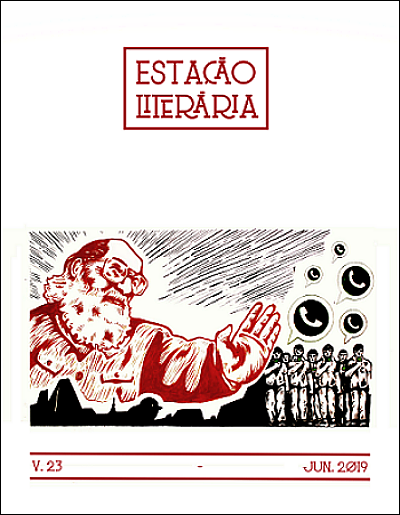The bildungsroman in the service of history. Indonesian modernity in bumi manusia (1980), by Pramoedya Ananta Toer
DOI:
https://doi.org/10.5433/el.2019v23.e35348Keywords:
Indonesian literature, Pramoedya Ananta Toer, Formative novel, Historical fictionAbstract
The article locates Pramoedya Ananta Toer's Bumi Manusia within the tradition of the Bildungsroman, highlighting how he updates the genre by endowing it with elements of historical fiction. Toer identifies the Enlightenment ideal of formation as a product of a European reality, unavailable to native Indonesians under the yoke of the Netherlands. Once the protagonist recognizes the impossibility of developing in that society, he reaches a new level of awareness about the condition of his countrymen. From there, the novel follows a different dynamic; before describing the development of an exemplary individual, it becomes a genealogical account of anti-colonial Indonesian consciousness.Downloads
References
DAY, Tony. 'Self' and 'Subject' in Southeast Asia Literature in the Global Age. In: ROBINSON, Kathryn (Ed.) Asian and Pacific Cosmopolitans: Self and Subject in Motion. Houndmills: Palgrave, 2007, p. 19-36.
GOETHE, Johann Wolfgang von. Os Anos de Aprendizagem de Wilhelm Meister. São Paulo: Ed. 34, 2006.
GoGWILT, Christopher Lloyd. The Vanishing Genre of the Nyai Narrative: Reading Genealogies of English and Indonesian Modernism. Comparative Literary Studies, v. 44, n. 4, p. 409-433., 2007.
GRASS, Günter. Die Blechtrommel. Hamburg: Fischer, 1962.
LUKÁCS, Györg. A teoria do Romance. São Paulo: Duas Cidades/Editora 34, 2000.
NIEKERK, Carl. Modernity, Sexuality, and Gender in Pramoedya Ananta Toer’s This Earth of Mankind (1980). Symposium: a Quarterly Journal in Modern Literatures, v. 65, n. 2, p. 77-98, 2011.
PRAMOEDYA ANANTA TOER GEÏNTERVIEWD DOOR RUDY KOUSBROEK. Ikon. Amsterdam: Cultura 24, 8 de setembro de 2012. Programa de TV.
RICKLEFS, Merle Calvin. A History of Modern Indonesia since c. 1200. Houndmills: Palgrave, 2001.
SARTRE, Jean-Paul. Prefácio ao “Os Condenados da Terra” de Frantz Fanon. In: SARTRE, Jean-Paul. Colonialismo e neocolonialismo. (Situações V). Rio de Janeiro: Tempo Brasileiro, 1968.
SCHULTZ, Daniel F.; FELTER, Maryanne. Education, History, and Nationalism in Pramoedya Toer’s ‘Buru Quartet’. Crossroads: an Interdisciplinary Journal of Southeast Asian Studies, v. 16, n. 2, p 143-175, 2002.
SELBMANN, Rolf. Der deutsche Bildungsroman. Stuttgart: Metzler Verlag, 1984.
SIEBERT, Rüdiger. Leseproben – Indonesiens Beitrag zur Weltliteratur Pramoedya Ananata Toer (1923 – 2006). DIG. Deutsch-Indonesische Gesellschaft e.v. Disponível em: http://www.adtractive.de/dig_new/leseproben-indonesiens-beitrag-zur-weltliteratur-pramoedya-ananata-toer-1923-2006/. Acesso em: 13 nov. 2018.
TOER, Pramoedya Ananta. Esta Estranha Terra. Traduzido por Daniela García. Lisboa: Quetzal, 2003.
TOER, Pramoedya Ananta. Bumi Manusia. Sebuah Novel Sejarah. Buku Pertama dari Seri 4 Jilid. Yogyakarta: Hasta Mitra, 2002a.
TOER, Pramoedya Ananta. Anak Semua Bangsa. Sebuah Novel Sejarah. Buku ke-dua dari Seri 4 Jilid. Yogyakarta: Hasta Mitra, 2002b.
TOER, Pramoedya Ananta. Footsteps. Translated by Max Lane. New York: Penguim Books, 1996.
TOER, Pramoedya Ananta. This Earth of Mankind. Translated by Max Lane. New York: Penguin Books, 1990.
TOER, Pramoedya Ananta. Exile: Pramoedya Ananta Toer in Conversation with André Vltchek and Rossie Indira. Chicago: Haymarket Books, 2006.
TSUCHIYA, Kenji. Popular Literature and Colonial Society in Late-Nineteenth-Century Java. Cerita Nyai Dasima, the Macabre Story of an Englishman’s Concubine. Southeast Asian Studies, v. 28, n. 4, p. 467-480, Mar. 1991 .
VICKERS, Adrian. A History of Modern Indonesia. Cambridge: Cambridge University Press, 2005.
Downloads
Published
How to Cite
Issue
Section
License
A revista se reserva os direitos autorais sobre as contribuições publicadas, sem retribuição material para o autor, podendo disponibilizá-las on-line no modo Open Access, mediante sistema próprio ou de outros bancos de dados; também poderá efetuar, nos originais, alterações de ordem normativa, ortográfica e gramatical, com o intuito de manter o padrão culto da língua, contando com a anuência final dos autores. As opiniões emitidas pelos autores são de sua exclusiva responsabilidade.












